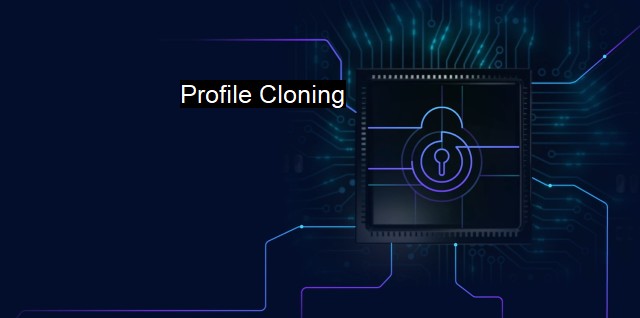What is Profile Cloning?
The Growing Threat of Profile Cloning in Cybersecurity: Impersonating Online Users through Sophisticated Social Engineering Techniques
"Profile Cloning" is a critical aspect talked about extensively in the interconnecting worlds of cybersecurity and antiviruses. It refers to the process in which cybercriminals replicate or impersonate a user's social media or other online profiles. By mimicking the particulars of the targeted user, including their interests, activities, and images, the perpetrators create a convincing counterfeit profile, primed to deceive the unsuspecting contacts of the original user.These malicious clone profiles are then utilized to forge trust and rapport with the friends, colleagues, or associates of the individual whose profile has been cloned. Leveraging this network of trust earned using the cloned profile, the impersonator disseminates malicious content which can include malware, adware, links to phishing sites, requests for money, or inaccurate information.
Profile cloning presents a substantial cybersecurity risk because it is relatively simple yet effective. All it takes is a social engineering tactic to carry out profile cloning. Any user can fall victim to this type of fraudulent activities, which relies on exploiting the human nature of trust and familiarity.
The impact of profile cloning could be quite severe, beyond what appears at surface level. A cloned profile, carrying the potential of being perceived as a legitimate profile, could provoke a series of cybersecurity breaches. The message sent from these counterfeit profiles could lead to wholesale theft of sensitive data, inflicting damage upon individuals or institutions. In several instances, it has led to reputation damage, privacy invasions, and not to mention serious mental stress on victims of cloned profiles.
Many cybercriminals often clone profiles for phishing activities. Phishing is a form of cyber-attack that attempts to deceive users into revealing their personal, financial, or other sensitive information. When the user clicks on a malicious link or performs a questionable action prompted by a fake profile that resembles their trusted contact, this personal information is sent directly to the fraudster and could be misused in countless ways. Therefore, alongside potential cybersecurity breaches, identity theft is also a major concern rising from the issue of profile cloning.
Identifying a cloned profile involves vigilant observation from both individuals and corporations. Big tech corporations actively employ AI and machine learning algorithms to detect fraudulent activities, including profile cloning. individual awareness can significantly contribute to the issue. Detecting minor changes in the way people communicate online, abrupt requests, foreign language anomalies, disturbingly enticing click baits, can lead an individual to spot profile cloning before the damage is done.
Antiviruses can safeguard a person’s computer by detecting and combating cyber threats like viruses, malware, adware which uses profile cloning as a vehicle of infiltration. Regular virus scans and web protection services of Antivirus software provide robust web security. It also blocks websites containing malicious or insecure links, providing safe browsing and protecting users' computers from potential attacks stemming from cloned profiles.
Despite these protective measures, profile cloning's insidious nature makes it challenging to completely alleviate. Updating privacy settings for social media is recommended and limiting accessibility of personal details to the public can mitigate potential risks.
Profile cloning is a social engineering tactic practiced by cybercriminals. Frauds clone profiles to deceive contacts of the original users into exposing personal information or trick them into sprinkling harmful content, software, or scams within the network. Both individual vigilance and technological interventions existing in the form of cybersecurity measures and antiviruses are necessary to counteract such malicious activities. Yet, the ultimate protector is awareness, proposing a constant need to stay updated and informed about different forms and methods employed in cybercrimes, including profile cloning.

Profile Cloning FAQs
What is profile cloning in cybersecurity?
Profile cloning is a technique wherein hackers create a fake profile or user account that looks identical to a legitimate one. Hackers use this technique to trick users into sharing sensitive information or clicking on malicious links. It is commonly used in phishing attacks and other cyberattacks.How do hackers clone profiles?
Hackers clone profiles by gathering information about a legitimate user account, such as the profile picture and personal information. They then create a fake profile using this information and make it look identical to the legitimate one. The hacker can then use this fake profile to carry out various attacks.What are the risks of profile cloning to my cybersecurity?
The risks of profile cloning include identity theft, financial fraud, and malware infection. If a hacker clones your profile, they can use it to send phishing emails or messages that trick your contacts into clicking on malicious links or sharing personal information. They can also use your profile to spread malware or steal your sensitive data.How can I protect myself from profile cloning attacks?
To protect yourself from profile cloning attacks, you should be cautious about accepting friend requests or messages from unknown people. You should also avoid clicking on links or downloading attachments from unknown senders. Additionally, you should use strong and unique passwords for your accounts and enable two-factor authentication. Lastly, you should keep your operating system and antivirus software up to date to prevent malware infections.| | A | | | B | | | C | | | D | | | E | | | F | | | G | | | H | | | I | | | J | | | K | | | L | | | M | |
| | N | | | O | | | P | | | Q | | | R | | | S | | | T | | | U | | | V | | | W | | | X | | | Y | | | Z | |
| | 1 | | | 2 | | | 3 | | | 4 | | | 7 | | | 8 | | |||||||